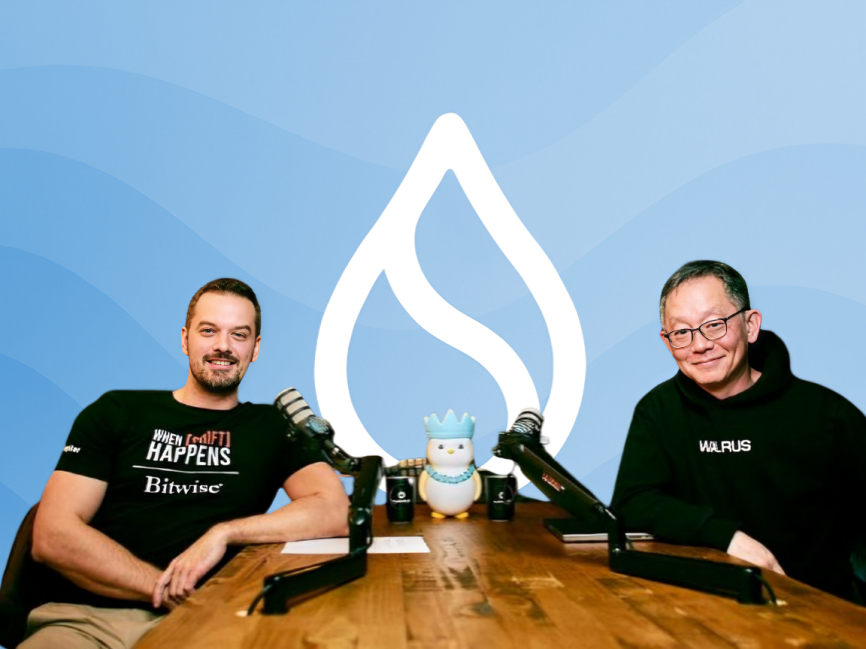Sui Is Not the Next Solana: Why Evan Cheng Left Facebook to Build the Blockchain That Works
Evan Cheng sat down with me on the 125th episode of When Shift Happens to unpack a bold ambition: fixing the broken foundation of the crypto world.
As the co-founder and CEO of @Mysten_Labs, the team behind the @SuiNetwork, @EvanWeb3 left a comfortable role at Facebook at age 50 to build what no one else in the blockchain space had managed: infrastructure that actually works for users and businesses.
In this deeply personal and technical conversation, he reflects on the failures of decentralisation, lessons from Libra, and what it really means to start over, later in life, with conviction.
The Failure of Decentralisation
From the outset, Evan is blunt: “Nothing in this space has won.” Despite the hype, the crypto world has consistently failed to deliver on the promise of decentralisation. Projects either collapse under their own complexity or fall back into centralised control—something Evan has witnessed first-hand. “Every mistake you make in infrastructure makes it very convenient to fall back to centralisation,” he says.
He calls out Ethereum as a case study in this regression: “Where are most things happening? On Base. And they don’t even pretend it’s decentralised.” For Evan, the issue isn’t decentralisation as a concept, it’s the flawed infrastructure that makes decentralisation practically unworkable. Users often fall back to centralised exchanges and services because current systems are too slow, fragile, or costly to trust.
“What people forget is that when someone builds a product, it becomes a business,” Evan explains. “And if it’s a business, it needs to be profitable. That’s why the ideal isn’t really working.”
Leaving Facebook to Start Over at 50
Most people see their 50s as a time to slow down. Not Evan Cheng.
After leading Facebook’s now-defunct crypto project, Libra (later Novi), Evan realised meaningful change would require stepping away from big tech. “It’s very difficult to change people’s minds in a big company,” he recalls.
By the time Libra was shut down and Novi merged with other teams, Evan had already decided it was time to leave. He departed with no product, no protocol design, and no certainty, only a vision. “We felt like if we didn’t do it, no one would,” he says. Together with four co-founders, most of whom had worked with him at Meta, Evan launched Mysten Labs to build the infrastructure crypto needed.
He also started his first company at 51. “Clearly it’s not too late to start,” he says, especially not in crypto, a space typically dominated by twenty-somethings. The bigger challenge was on the personal front. “There’s a lot of sacrifice,” he admits. From predictable routines to a life of chaos, family, travel, and social responsibilities, everything changed. “My friends thought I’d gone to the dark side,” he laughs.
Even his wife needed convincing. Evan didn’t negotiate; he built credibility. “I had to prove myself again." Everything from raising funds, building a team, to launching products was about earning that trust and showing progress.
Mysten Labs and the Power of First Principles
Evan isn’t interested in iterating on the past. “We’re not building a better Solana,” he insists. “We’re identifying the problem, then building the solution.” Sui is not an EVM-compatible chain. It uses the Move programming language, supports composable on-chain data, and includes tools like zkLogin for easier onboarding.
What makes Sui unique, Evan says, is that it brings together design, engineering, and user needs all at once. “It’s all of the above. People fail to understand that. It’s not just engineering, it’s design.”
Mysten’s five co-founders didn’t set out with titles and rigid job descriptions. They just started working. “We never argued about who owns what,” Evan says. “We trusted each other, and that trust came from having built things together before.”
Their previous experience together at Meta forged mutual trust, and a clear articulation of each founder’s role helped get VCs on board, despite conventional wisdom advising against funding teams that large.
Even defining what Mysten Labs is remains open-ended. “The company’s mission is to enable business transformation through decentralisation,” Evan explains, “but I don’t want to say anything that limits our potential.”
A Culture of Agency and Trust
One of Evan’s deepest convictions is about agency. Mysten was built for high-agency people, the kind who don’t wait for permission to act.
This approach stems from frustration with big tech’s bureaucracy. “Most people want to do the right thing. But big companies beat that instinct out of you.” At Mysten, the team removes those frictions. Decisions are made by those closest to the problem, guided by data, capability, mutual trust, and overall alignment.
Even among the five co-founders, conflict is navigated with the shared understanding that the relationship comes first. “If you approach conflict knowing you’ll find a path forward, you handle it differently,” Evan says.
What the Future Holds
When asked if he feels like he’s made it, Evan laughs. “We had a t-shirt that said: ‘One year done. 1% solved.’ And honestly, I think we’ll always be at 1%.” For him, the journey is about constant iteration. But that doesn’t mean progress isn’t happening. Sui has already attracted users, partners, and real businesses building on its tech. “We’re seeing people use Sui not just because it exists, but because it works.”
He believes that in 24 months, people will look back and realise their imagination was too small. “The impact is orders of magnitude bigger than what we can see now.”
So what does success look like to Evan? It’s not a coin price or a killer app. It’s feeling free. “I’m happy when I’m doing what I want to do, surrounded by people I respect and trust. That’s everything.”
Final Thoughts
Evan Cheng’s journey is a rare combination of technical brilliance, existential reflection, and unshakeable conviction. This episode isn’t just about a blockchain; it’s about what happens when someone refuses to accept compromise, even late in life.
Whether you’re a builder, founder, or sceptic, there’s something vital in this conversation about what crypto could, and still might, become.
👉If you enjoyed reading the summary, head over to When Shift Happens on YouTube or your favorite podcast platform to access the full convo.

91
11.44K
The content on this page is provided by third parties. Unless otherwise stated, OKX is not the author of the cited article(s) and does not claim any copyright in the materials. The content is provided for informational purposes only and does not represent the views of OKX. It is not intended to be an endorsement of any kind and should not be considered investment advice or a solicitation to buy or sell digital assets. To the extent generative AI is utilized to provide summaries or other information, such AI generated content may be inaccurate or inconsistent. Please read the linked article for more details and information. OKX is not responsible for content hosted on third party sites. Digital asset holdings, including stablecoins and NFTs, involve a high degree of risk and can fluctuate greatly. You should carefully consider whether trading or holding digital assets is suitable for you in light of your financial condition.

